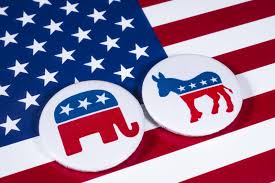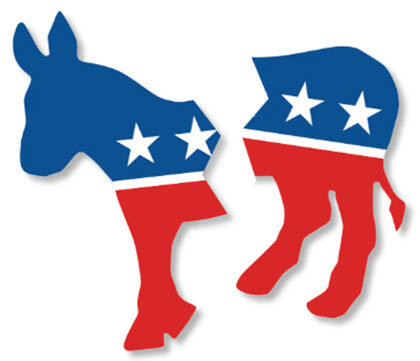We Could Be Down to One Party If Democrats Don’t Solve Their Media Problem
Dec 19 2024
After a crushing defeat at the polls, the Democratic Party is in a quandary, trying to find a way forward. It has seen its traditional constituency, the working class, usurped by the Republican Party – or should we call it the Trump Party — and must discover how to bring the flock back into the fold. The left espouses a host of programs that voters want, but there's a problem: How will Democrats make themselves known? How will they reach the public?
The Trump campaign emerged from the election well ahead of Democrats for having exploited every avenue to reach voters. They exhibited remarkable savvy about where all age groups go to form their opinions, leaving Democrats breathless trying to catch up. We touched on this a few weeks ago but the right-wing's dominant saturation needs emphasis.
elephantineCable may be fading, but the right-wing fields three national channels of any weight — Fox, Newsmax, and OAN. The left only one. In broadcast, the Sinclair network has gobbled up 300 local television stations that deliver a decidedly right-wing slant in news programming — all of them on occasion even required to recite verbatim on a given night a political message supplied by management. Right-wing and Christian talk radio, built up over decades, boasts over 1500 stations, says one source, demonizing the left around the clock.
What’s new is Elon Musk's X – Twitter newly given over to unmoderated misinformation from those in Trump world who have no voice elsewhere. And the Trump campaign courting TikTok influencers. And being smart enough to exploit the podcast realm, where such luminaries as Joe Rogan, Steve Bannon, and Ben Shapiro lead a large contingent of right-wing dissidents. Rogan has claimed "I go left on everything",
but he soured on Biden's Covid mandates and progressive extremes and switched sides. His 14.5 million adherents on Spotify, which paid him an estimated $350 million for rights to his show, skew 80% male and download his two or three weekly podcasts some 400 million times a month. In the final weeks of the campaign, Trump, Vance, and Musk paid multiple visits to the podcasters to win especially the young male vote. Rogan's three-hour interview with Trump scored 52 million views on YouTube. Rogan endorsed Trump just before the election.
In contrast, Kamala Harris avoided interviews but did go on Alex Cooper's podcast "Call Her Daddy" (followers 90% female, says Cooper). The subject was women's rights. A booking with Rogan was in the offing but Harris reportedly required Rogan to travel to her rather than she to him. He declined. No interview.
overwhelmedThis phalanx has totally eclipsed the meager number of left-wing counterparts. There are the left-tilting Public Broadcasting Service (PBS) and National Public Radio (NPR) but the support they receive from the Corporation for Public Broadcasting’s $535 million in annual government funding will have DOGE duo Elon Musk and Vivek Ramaswamy asking why should the government go on and on subsidizing television and radio as if it’s still 1967 when the CPB was founded.
The left has the one cable channel, MSNBC, but media colossus Comcast is planning to spin off its cable properties which include MSNBC and CNBC as a separate entity whimsically named SpinCo. That news had Donald Trump Jr. tweeting on X ”Hey @elonmusk I have the funniest idea ever!!!” suggesting that Musk buy MSNBC. "I mean it can’t be much. Look at the ratings". It started as a joke but quickly spurred investor interest. That would shut down the one on-air voice the left-wing has.
That leaves the press. The right proclaims that mainstream media is dead, left to the older generations who still watch broadcast news and read the liberal New York Times, Washington Post, Los Angeles Times and a few others in a flickering universe. Younger generations have decided to go elsewhere. They had already left, 
well before the election, but their defection was validated when owners Jeff Bezos of the Post and Patrick Soon-Shiong of the L.A. Times halted publication of their editorial boards' endorsement of Kamala Harris. Yale history professor and fascism scholar called out their "anticipatory obedience"; he would be quoted often (reduced to “surrender in advance”) as others caved, such as ABC television paying $15 million to settle a defamation suit brought by Trump. Soon-Shiong is now meddling further, telling the edit staff to "take a break from writing about Trump".
No wonder "that many Americans don’t read, trust, or really care all that much about what papers" have to say, writes Charlie Warzel at The Atlantic. It's the distrust that awaits a thesis to explain how that came to pass over recent decades, with only 31% telling Gallup that they trust the mainstream media. Many cite the objectivity standard giving way as opinion crept into the news columns, but readers prefer opinion to news, so that doesn't hold up as a principal reason.
Already by 2014, Pew Research found that 75% of adults they surveyed said that they felt more informed by the Internet and social media than traditional sources. Pew says newspaper readership nosedived in 2021 and 2022, especially. With the 2020 election and insurrection over and Trump consigned to Mar-a-Lago and golf, the news evidently lost its entertainment appeal. Republicans might argue that the liberal media drove away readers with their obsession for diversity and equity and a preoccupation with LGBTQ and transgender issues, whereas the nation at large was stressed by the threat of losing jobs to the flood of migrants and the soaring prices at the supermarket.
anything goesJournalism prides itself on fact-based reporting – applied to commentary as well. A good newsroom is steeped in ethics. Those standards and practices are up against an online world of streaming talk with no self-restraint and a disregard for facts. “An allergy to editing”, as Warzel puts it. Millions of younger people have turned to influencers and creators on Instagram and TikTok and the hours-long rambling of podcast hosts as trusted purveyors of news. From all these right-wing conduits, devoted followers were hearing before the election that crime is at unprecedented levels (it has been declining for years), that hoards are still crossing the southern border (the numbers are way down), that the economy is a disaster (it's booming). Tressie McMillans Cottom is an associate profesdor at the University of North Carolina, Chapel Hill. Here is her take on podcasters from a New York Times guest column:
"To be a podcast bro you generally must be marginally famous for some inscrutable reason, make contrarian ideas out to be intellectualism and promote yourself as an 'independent thinker' while booking attention-grabbing, politically extreme guests. Then you can monetize your show, looking entrepreneurial by selling a range of junk goods that cozy up to disinformation about vaccines, health, fitness and investing."
The rule for success on the Internet is omnipresence, capturing eyes and ears with constant video and posting to create a relationship with viewer or reader, a kind of intimacy. But the commentary is whatever comes to mind, with falsehood and truth randomly intermixed and many of the influencers themselves likely not knowing which is which.
Their utterances become the news for the legions of followers. Or, as Musk and others have taken to telling them, "You are the media now". They are told to “do your own research” and “be a freethinker”, a prescription to steer them away from factual reporting. MAGA world sees the possibilities of influencing the influencers. It is an ecosystem that trades in unsourced gossip, QAnon conspiracy theories (the government caused Hurricane Helene!), and misinformation.
where to?This is the thicket that Democrats must penetrate and discredit if they are to regain the allegiance of the public. They will need to build an infrastructure in this new media mix where people now go to find out what's new. They will need to go about it very differently, though. Quality reporting that exposes the lies of the opposition could prove to be an attractant for those suffering from “brain rot”, the Oxford Word of the Year.
Please subscribe if you haven't, or post a comment below about this article, or
click here to go to our front page.

